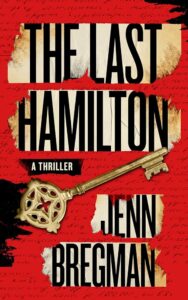Launch Day finally arrived this month! For me, and about 11,000 of my not-so-closest friends. With over four million books published each year, coupled with the additional diversions of social media and media of every kind, it’s challenging to carve out a slice of attention. Even an incremental advantage can cut through the noise and help your readers find you.
Enter trend writing. Many authors try to write into trends, such as the seemingly ubiquitous romance genre. That can work, providing that style is in your bailiwick. But I’m speaking to an even more narrow niche, that of current events. Is it possible to not only predict current events years in advance but to time your book release to coincide with them?
No. It’s not. Unless you’re a soothsayer and then you’re writing in a different genre altogether.
If you try and you’re lucky, you could get a publicity bump from regular media as well as literary media. But if you fail, your work might be deemed obsolete. Like a Blackberry only worse. I advocate middle ground. We can be aware. As authors, and (hopefully) human beings, we are influenced and impacted by the world. We tend to have greater acuity for things going on around us. This typically means more timely subjects anyway. If we write from that place, we will have a story that stands on its own regardless of current events or popular opinions. If a story needs to be propped up by the artifice of current events, it’s most likely a story that lacks depth and craft anyway. We should write what we know, write authentically, and write the best work we can. Implicit in this is not artificially layering on an angle, plot or device just because it’s presently viewed as timely. Not only is it unlikely to read well, but it’s also likely that the reader will be able to sniff out the subterfuge to painful results.
In my spotty recollection, notable times I have seen current events positively impact book sales were during the pandemic when books concerning pandemics, both fiction and nonfiction, benefitted from a boost as well during the initial release of Hamilton the Musical when books concerning the Hamilton family and other revolutionary figures received similar boosts. Books concerning climate change are having their own moment in the sun now as well. But this supports my point. These books were well crafted and could stand on their own merit, without seeking to be bootstrapped into the limelight by sheer caprice.
There is, however, nothing wrong with being strategic and using the facts as you find them. As a lawyer, I practiced Big Law for many years as a litigator and then in banking and finance on Wall Street. One of my favorite adages in the profession is: “If you have the facts, argue the facts. If you have the law, argue the law. If you have neither, pound the table.” So, yes. If you can find facts and current events to bolster your book’s publicity, by all means do.
This takes a little ingenuity and creative research. If you deal with broad themes in your storyline, general news will usually suffice. Maintain a reliable feed that will offer quick look headlines that you can scroll through for any possible angle. I was able to do this successfully in my newly released thriller, The Last Hamilton, because while The Last Hamilton holds weight for those interested in historical thrillers, it also has a storyline that is surpercharged by current headlines. This storyline is about currencies, crushing the U.S. economy and destroying America without firing a shot. The threat of de-dollarization, and the survival of the dollar as the reserve currency of the world is so real and imminent that on November 30, 2024 president-elect Trump posted this threat on Truth Social: “We require a commitment from these Countries that they will neither create a new BRICS currency, nor back any other Currency to replace the mighty U.S. Dollar or, they will face 100% Tariffs, and should expect to say goodbye to selling into the wonderful U.S. Economy.”
Bullseye. A fictional plot takes on an In Real Life gloss that makes it even more compelling and exciting.
If you have smaller, more niche themes in your storyline, you can also hook easily into current events for a typically more narrow but deeper publicity bump. For instance, Jessica Strawser’s The Last Caretaker and C.I. Jerez’ upcoming release At the Island’s Edge involve themes of domestic violence and women in combat. respectively. Both publicity campaigns involve finding tracking current events that are pertinent. Although there may be fewer numbers of readers in these niches, those there tend to be passionate about these areas and are even more likely to buy and support books that embrace these issues. An added benefit is that the authors are passionate about these areas as well.
Finally, and most importantly, is the 35,000-foot view before planning your publicity campaign. Step back, or up, and study your book from a marketer’s perspective. What can you use? What can you try? With social media, nothing is a forever disaster. If an angle doesn’t work, try another. Dig deep as well as broad. Current events may end up adding a point and compelling nuance and context where none was intended at the outset. Happy writing!
***


















